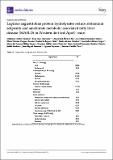Por favor, use este identificador para citar o enlazar a este item:
http://hdl.handle.net/10261/250432COMPARTIR / EXPORTAR:
 SHARE
BASE SHARE
BASE
|
|
| Visualizar otros formatos: MARC | Dublin Core | RDF | ORE | MODS | METS | DIDL | DATACITE | |

| Título: | Lupinus angustifolius Protein Hydrolysates Reduce Abdominal Adiposity and Ameliorate Metabolic Associated Fatty Liver Disease (MAFLD) in Western Diet Fed-ApoE−/− Mice |
Autor: | Santos-Sánchez, Guillermo CSIC ORCID; Cruz-Chamorro, Iván CSIC ORCID; Álvarez-Ríos, Ana Isabel CSIC ORCID; Fernández-Santos, José María; Vázquez-Román, María Victoria; Rodríguez-Ortiz, Beatriz; Álvarez-Sánchez, Nuria CSIC ORCID; Álvarez-López, Ana Isabel CSIC ORCID; Millán-Linares, María del Carmen CSIC ORCID ; Millán, Francisco CSIC ORCID ; Pedroche, Justo CSIC ORCID ; Fernández-Pachón, María Soledad; Lardone, Patricia Judith CSIC ORCID; Guerrero, Juan Miguel; Bejarano, Ignacio CSIC ORCID; Carrillo-Vico, Antonio CSIC ORCID | Palabras clave: | Lupin Bioactive peptides NAFLD Oxidative stress Inflammation Adipose tissue Steatosis Cholesterol LDL |
Fecha de publicación: | 29-jul-2021 | Editor: | Multidisciplinary Digital Publishing Institute | Citación: | Antioxidants 10 (8): 1222 (2021) | Resumen: | Metabolic-associated fatty liver disease (MAFLD) is the most important cause of liver disease worldwide. It is characterized by the accumulation of fat in the liver and is closely associated with abdominal obesity. In addition, oxidative stress and inflammation are significant features involved in MAFLD. Recently, our group demonstrated that lupin protein hydrolysates (LPHs) had lipid lowering, antioxidant, and anti-inflammatory effects. Sixty male mice fed with a Western diet were intragastrically treated with LPHs (or vehicle) for 12 weeks. Liver and adipose tissue lipid accumulation and hepatic inflammatory and oxidant status were evaluated. A significant decrease in steatosis was observed in LPHs-treated mice, which presented a decreased gene expression of CD36 and LDL-R, crucial markers in MAFLD. In addition, LPHs increased the hepatic total antioxidant capacity and reduced the hepatic inflammatory status. Moreover, LPHs-treated mice showed a significant reduction in abdominal adiposity. This is the first study to show that the supplementation with LPHs markedly ameliorates the generation of the steatotic liver caused by the intake of a Western diet and reduces abdominal obesity in ApoE−/− mice. Future clinical trials should shed light on the effects of LPHs on MAFLD. | Descripción: | 15 Páginas.-- 6 Figuras.-- 1 Tabla | Versión del editor: | http://dx.doi.org/10.3390/antiox10081222 | URI: | http://hdl.handle.net/10261/250432 | E-ISSN: | 2076-3921 |
| Aparece en las colecciones: | (IG) Artículos (IBIS) Artículos |
Ficheros en este ítem:
| Fichero | Descripción | Tamaño | Formato | |
|---|---|---|---|---|
| antioxidants-10-01222-v2.pdf | Artículo principal | 1,98 MB | Adobe PDF |  Visualizar/Abrir |
| antioxidants-1309251-supplementary.pdf | Material suplementario | 241 kB | Adobe PDF |  Visualizar/Abrir |
CORE Recommender
Page view(s)
94
checked on 17-abr-2024
Download(s)
108
checked on 17-abr-2024
Google ScholarTM
Check
Este item está licenciado bajo una Licencia Creative Commons

